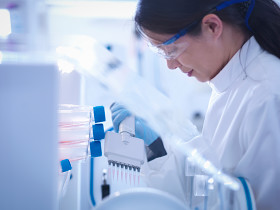 In the United States, over 2 million units of platelets per year are transfused, but shortages for platelets are common due to limited donors and a 5-day shelf-life.
In the United States, over 2 million units of platelets per year are transfused, but shortages for platelets are common due to limited donors and a 5-day shelf-life.
Platelet transfusion also carries risks of transfusion transmitted infections, alloimmunization, and transfusion reactions. Scientists have recently designed a silicon-based bioreactor that mimics the physiological conditions of bone marrow, where platelets are produced in vivo. Within the bioreactor, vascular shear stress triggered platelet production twice as fast as cells in static cultures. Furthermore, megakaryocytes from human-induced pluripotent stem cells which were cultured in the bioreactor produced platelets that were structurally and functionally similar to platelets produced in vivo. Additional studies and clinical trials are needed. However, producing platelets in vitro may help alleviate platelet shortages and reduce donor-associated complications from platelet transfusions.
